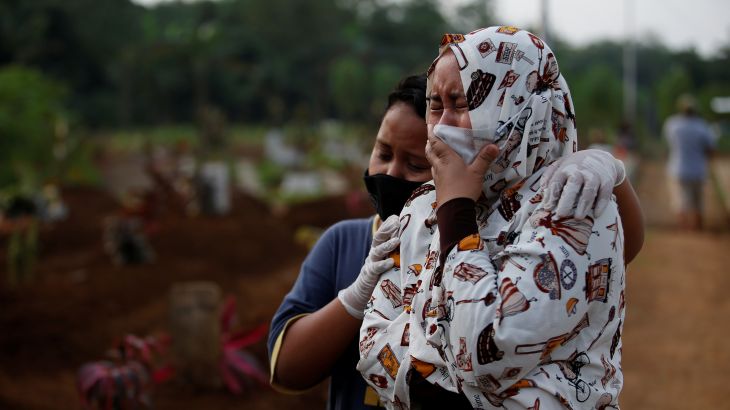
Why has COVID-19 taken hold in Indonesia?
On Monday, July 26 at 19:30GMT:
Indonesia, the world’s fourth most populous country, last week reported the most new COVID-19 infections in the world and experts expect the situation there to get even worse.
On Friday, the country recorded 49,509 new infections and 1,280 deaths but researchers say the real figures could be much higher because of extremely low testing rates. It is believed the Delta variant is behind the surge despite strict restrictions on movement within the country.
Indonesia has now overtaken India as the epicentre of the pandemic in Asia and, like India two months earlier, its health system is at breaking point. Authorities have turned government buildings, car parks and sport stadiums into isolation and treatment areas. The country has received ventilators, vaccines, oxygen tanks, testing kits, and other medical equipment from the US, Australia, India, China, UAE, and Singapore.
And medical staff are bearing the brunt of the surge. According to the Indonesia’s Medical Association (IDI), 14 doctors died from July 1 to July 17.
Indonesia’s COVID-19 assistance programmes have been mired in corruption allegations since last year. Volunteers are helping to secure oxygen and hospital beds – and even to bury the dead. Indonesian social media is flooded with requests for help and volunteer-driven initiatives.
Only about 15 percent of Indonesia’s 270 million people have received one vaccine dose and just 6 percent are fully vaccinated. Indonesia has also relied heavily on the vaccine made by Sinovac Biotech, a Chinese company, which has proven to be less effective than other vaccines.
In this episode, we’ll ask how Delta variant has taken such a firm grip on Indonesia and discuss what’s to come.
In this episode of The Stream, we are joined by:
Jessica Washington, @JesWashington
Al Jazeera Correspondent
Dicky Budiman, @drdickybudiman
Epidemiologist, Griffith University, Australia
Tiara Marthias, @timarthias
Health systems researcher